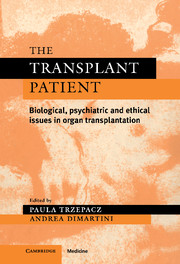Book contents
- Frontmatter
- Contents
- List of contributors
- Preface
- 1 The mystique of transplantation: biologic and psychiatric considerations
- 2 Psychosocial screening and selection of candidates for organ transplantation
- 3 Psychosocial issues in living organ donation
- 4 Quality of life in organ transplantation: effects on adult recipients and their families
- 5 Quality of life of geriatric patients following transplantation: short- and long-term outcomes
- 6 Cognitive assessment in organ transplantation
- 7 Pharmacologic issues in organ transplantation: psychopharmacology and neuropsychiatric medication side effects
- 8 Alcoholism and organ transplantation
- 9 Ethics and images in organ transplantation
- 10 Psychoneuroimmunology and organ transplantation: theory and practice
- 11 Pediatric transplantation
- 12 Current trends and new developments in transplantation
- Index
1 - The mystique of transplantation: biologic and psychiatric considerations
Published online by Cambridge University Press: 14 September 2009
- Frontmatter
- Contents
- List of contributors
- Preface
- 1 The mystique of transplantation: biologic and psychiatric considerations
- 2 Psychosocial screening and selection of candidates for organ transplantation
- 3 Psychosocial issues in living organ donation
- 4 Quality of life in organ transplantation: effects on adult recipients and their families
- 5 Quality of life of geriatric patients following transplantation: short- and long-term outcomes
- 6 Cognitive assessment in organ transplantation
- 7 Pharmacologic issues in organ transplantation: psychopharmacology and neuropsychiatric medication side effects
- 8 Alcoholism and organ transplantation
- 9 Ethics and images in organ transplantation
- 10 Psychoneuroimmunology and organ transplantation: theory and practice
- 11 Pediatric transplantation
- 12 Current trends and new developments in transplantation
- Index
Summary
Most major advances in medicine spring from discoveries in basic science and are therefore predictable, or at least logical. Organ transplantation was the supreme exception to the rule. Although the potential benefit of whole-organ replacement in the absence of an immune barrier was dramatically demonstrated with the identical-twin kidney transplantation performed, in December 1954, by Joseph E. Murray (Nobel Laureate, 1990; Merrill et al. 1956), this achievement only confirmed what already was known to be possible with identical-twin skin grafts (Padgett 1932; Brown 1937). In 1961, two months after receiving the 1960 Nobel Prize for research in immunology, Macfarland Burnet wrote in the New England Journal of Medicine that “much thought has been given to ways by which tissues or organs not genetically and antigenetically identical with the patient might be made to survive and function in the alien environment. On the whole, the present outlook is highly unfavorable to success …” (Burnet 1961).
This grim prospect, only a third of a century ago, faced the pioneer organ recipients whose courage in offering themselves up for human experimentation made it possible to crack the immunologic barrier (Starzl 1992). For three decades after this was done, there was no explanation for what had been accomplished. The resulting mystique of transplantation as well as the unpredictable outcome of these procedures created a fertile emotional soil for psychiatric complications.
- Type
- Chapter
- Information
- The Transplant PatientBiological, Psychiatric and Ethical Issues in Organ Transplantation, pp. 1 - 20Publisher: Cambridge University PressPrint publication year: 2000



